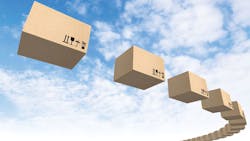If you could reduce your logistics costs by 9%, your inventory costs by 5% and your investment in logistics fixed assets by 15%, would you do so? Many manufacturers, not surprisingly, have said yes to all of the above, which helps explain the continuing popularity of third-party logistics providers (3PLs).
Whether it's the reduction or elimination of private truck fleets, the use of contract warehouses, or the outsourcing of such tech-heavy operations as bar coding or track-and-trace, manufacturers have found that hiring 3PLs allows them to focus on what they do best, and what they know best.
One area that both manufacturers and their retail customers don't really know very well at all is omni-channel distribution: the convergence of brick-and-mortar stores, online, catalog and mobile sales. In fact, according to the 2015 3PL Study conducted by Penn State University, Capgemini Consulting, Korn/Ferry International and Penske Logistics, 33% of respondents (manufacturers and retailers) say they're not currently prepared to handle omni-channel. Only a mere 2% say they consider themselves as top performers in the omni-channel space. (IndustryWeek served as media partner on the survey.)
The reason for the low confidence among manufacturers and retailers is they don't think their infrastructure can support a true omni-channel. Consumers trained on the Amazon model now expect every order they place -- whether over the web, at an in-store kiosk, or through a catalog -- to be shipped out at once from the nearest facility. But that kind of consumer demand is playing havoc with existing operations, as manufacturers traditionally almost never shipped orders directly to consumers -- that was the function of the retailers. Meanwhile, retailers almost never shipped orders from individual stores -- that was the function of fulfillment centers.
In the 3PL study, half of all respondents (50%) say they're not utilizing, piloting or even considering any of a number of omni-channel strategies, such as home delivery from local stores, Sunday delivery, locker pickups or drone delivery. The main reason they give for their "wait and see" attitude is a reluctance to dismantle their current operations to build new delivery channels. However, since no company wants to turn away customers, 3PLs are being asked to pick up the slack by offering pick-and-pack capabilities wherever needed. Expect to see omni-channel strategies become an important facet to the upcoming holiday shopping season, especially in the wake of Amazon and other retailers having to issue refunds and gift cards to customers whose orders didn't arrive before Christmas as promised.
"As customers continue to demand more from retailers and ultimately from 3PLs, it is likely that the 3PL business model will evolve further," says Shanton Wilcox, vice president of supply chain management with Capgemini Consulting. If the 3PLs creatively invest in omni-channel fulfillment solutions, these new solutions "have the potential to alter the way existing 3PLs do business."
About the Author
Dave Blanchard
Senior Director of Content
Focus: Supply Chain
Call: (941) 208-4370
Follow on Twitter @SupplyChainDave
During his career Dave Blanchard has led the editorial management of many of Endeavor Business Media's best-known brands, including IndustryWeek, EHS Today, Material Handling & Logistics, Logistics Today, Supply Chain Technology News, and Business Finance. He also serves as senior content director of the annual Safety Leadership Conference. With over 30 years of B2B media experience, Dave literally wrote the book on supply chain management, Supply Chain Management Best Practices (John Wiley & Sons, 2010), which has been translated into several languages and is currently in its second edition. He is a frequent speaker and moderator at major trade shows and conferences, and has won numerous awards for writing and editing. He is a voting member of the jury of the Logistics Hall of Fame, and is a graduate of Northern Illinois University.

